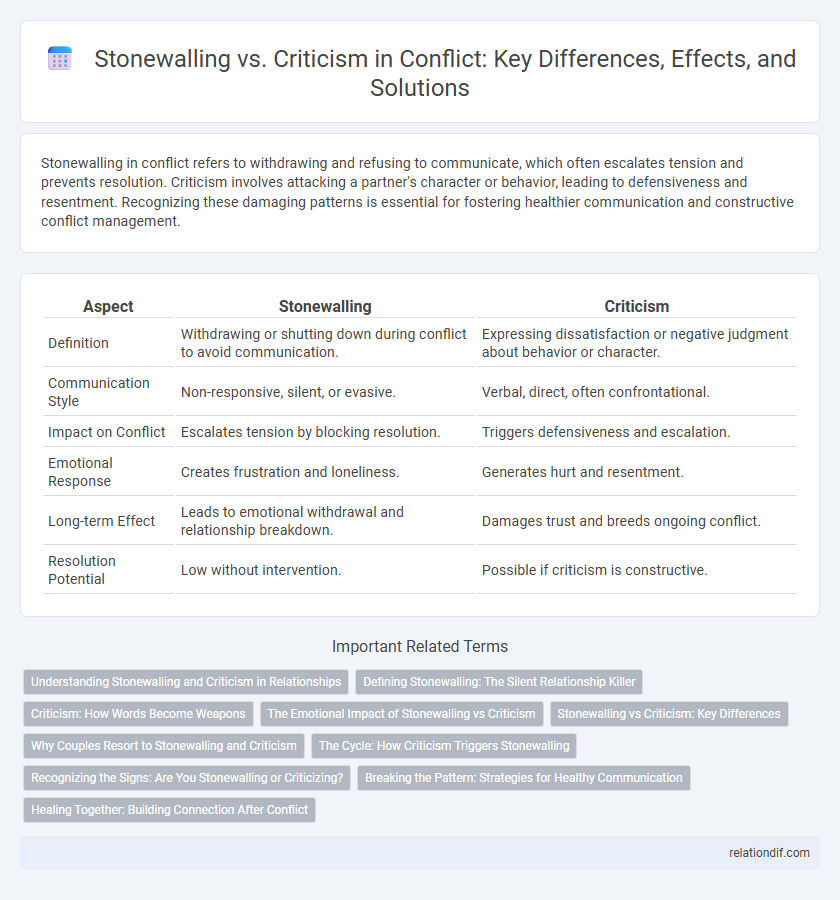Stonewalling in conflict refers to withdrawing and refusing to communicate, which often escalates tension and prevents resolution. Criticism involves attacking a partner's character or behavior, leading to defensiveness and resentment. Recognizing these damaging patterns is essential for fostering healthier communication and constructive conflict management.
Table of Comparison
| Aspect | Stonewalling | Criticism |
|---|---|---|
| Definition | Withdrawing or shutting down during conflict to avoid communication. | Expressing dissatisfaction or negative judgment about behavior or character. |
| Communication Style | Non-responsive, silent, or evasive. | Verbal, direct, often confrontational. |
| Impact on Conflict | Escalates tension by blocking resolution. | Triggers defensiveness and escalation. |
| Emotional Response | Creates frustration and loneliness. | Generates hurt and resentment. |
| Long-term Effect | Leads to emotional withdrawal and relationship breakdown. | Damages trust and breeds ongoing conflict. |
| Resolution Potential | Low without intervention. | Possible if criticism is constructive. |
Understanding Stonewalling and Criticism in Relationships
Stonewalling in relationships involves withdrawing or refusing to communicate, creating emotional distance and escalating conflicts, while criticism targets a partner's character or behavior, often leading to defensiveness and resentment. Understanding the dynamics of stonewalling and criticism is crucial for improving communication patterns, as stonewalling can signal emotional overwhelm and avoidance, whereas criticism typically reflects frustration expressed through negative judgments. Addressing these behaviors through empathy and constructive dialogue fosters healthier conflict resolution and strengthens relational trust.
Defining Stonewalling: The Silent Relationship Killer
Stonewalling is a destructive communication pattern in conflict characterized by emotional withdrawal and refusal to engage, often manifesting as silence, avoidance, or shutting down conversation. Unlike direct criticism, which highlights specific grievances or behaviors, stonewalling creates emotional distance and hinders resolution by blocking dialogue and understanding. Research links stonewalling as a primary predictor of relationship dissatisfaction and eventual breakdown.
Criticism: How Words Become Weapons
Criticism often transforms into a powerful weapon in conflicts by targeting a person's character instead of addressing specific behaviors, causing emotional harm and escalating tensions. Unlike stonewalling, which involves shutting down communication, criticism attacks verbally, triggering defensiveness and resentment. Understanding the impact of critical language is essential for breaking the cycle of conflict and fostering healthier communication.
The Emotional Impact of Stonewalling vs Criticism
Stonewalling during conflict triggers feelings of abandonment, frustration, and emotional disconnection as one partner shuts down communication entirely. In contrast, criticism often leads to defensiveness, hurt, and decreased self-esteem due to perceived personal attacks. Both behaviors damage emotional intimacy, but stonewalling's silence can create a more profound sense of isolation than the verbal confrontation of criticism.
Stonewalling vs Criticism: Key Differences
Stonewalling involves withdrawing from communication, refusing to engage or respond during conflicts, which creates emotional distance and stalls resolution. Criticism targets specific behaviors or character traits, potentially increasing defensiveness and escalating tension between parties. Understanding these key differences helps in addressing conflicts more constructively and fostering healthier communication patterns.
Why Couples Resort to Stonewalling and Criticism
Couples often resort to stonewalling and criticism as defensive mechanisms to cope with emotional overwhelm and unresolved conflicts. Stonewalling serves as an avoidance tactic to create distance and protect oneself from perceived attacks, while criticism functions as an expression of frustration or unmet needs. These behaviors typically emerge from communication breakdowns, heightened stress, and underlying relational dissatisfaction.
The Cycle: How Criticism Triggers Stonewalling
Criticism often ignites a defensive response known as stonewalling, creating a destructive cycle within conflicts. When one partner voices complaints, the other withdraws emotionally to avoid perceived attacks, escalating misunderstandings and frustration. This repetitive pattern undermines communication and intensifies relational discord, highlighting the need for mindful dialogue strategies.
Recognizing the Signs: Are You Stonewalling or Criticizing?
Stonewalling manifests through silence, avoidance, or refusal to engage during conflicts, signaling emotional withdrawal and a breakdown in communication. Criticism involves expressing dissatisfaction by targeting a partner's character or behavior, often leading to defensiveness and escalation. Recognizing these distinct signs helps individuals address underlying issues and promote healthier conflict resolution strategies.
Breaking the Pattern: Strategies for Healthy Communication
Breaking the pattern of stonewalling and criticism requires intentional strategies such as practicing active listening, expressing emotions with "I" statements, and setting clear boundaries to enhance mutual understanding. Implementing time-outs during escalating conflicts allows both parties to cool down and approach discussions more constructively. Consistent use of these techniques fosters healthier communication patterns and reduces emotional distance in relationships.
Healing Together: Building Connection After Conflict
Stonewalling creates emotional distance, hindering open dialogue and preventing resolution, while constructive criticism fosters understanding when delivered with empathy. Healing together after conflict requires recognizing these communication patterns, promoting vulnerability, and rebuilding trust through active listening and mutual respect. Engaging in compassionate conversations transforms conflicts into opportunities for deeper connection and collective growth.
stonewalling vs criticism Infographic

 relationdif.com
relationdif.com